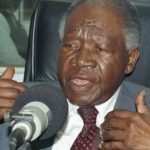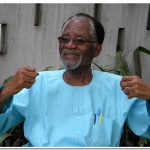From my Archives: Nigeria: The Curse Of Reluctant Leaders
Posted by By Akogun Akomolafe at 20 January, at 22 : 02 PM Print
Warning: count(): Parameter must be an array or an object that implements Countable in /home/alaye/public_html/wp-content/themes/Video/single_blog.php on line 46
Warning: count(): Parameter must be an array or an object that implements Countable in /home/alaye/public_html/wp-content/themes/Video/single_blog.php on line 56
From my Archives: Nigeria: The Curse Of Reluctant Leaders
It is said that “ifs” are useless tools of historical analyses; but one cannot but wonder what the trajectory of the Nigeria nation would have been IF she been blessed with leaders with vision in the mold of Kwame Nkrumah, Lee Kuan Yew, or Mahathir Mohammed!
But there’s absolutely no doubt that, given the sheer size of the country, a strong Nigerian leader with great vision would have altered the course of that country and, by implication, Africa’s progression for the better.
IF at independence, the country had been blessed with a Chairman Mao or a Nehru or a Nkrumah, or a Lee Kuan Yew, today Nigeria would have been up there with China, Singapore, Malaysia, and India.
Blessed with leaders with vision, Nigerians would not today still be struggling with life’s basics like inadequate food, erratic water supply, pitiable electricity supply and run-down infrastructures. Nigerians would be up there probing space and dreaming about sending an African astronaut to investigate the heavens.
Instead of wallowing in poverty like they currently do, Nigerians/Africans would also be world-class achievers with Nigerian/African scientists also inventing marvels to wow the world, and their industries would be churning out industrial outputs at neck-breaking speed.
Instead of our people selling dog-chains and old newspapers in the hot sun like they currently do, they would also be using their brains and talents to create the things that would improve their living standards.
The 21st century would not be referred to simply as the Asian Century but as Asian and African Century.
All these and much more would have been possible were Nigeria to have been blessed with leaders imbued with patriotic zeal, and who were prepared to put their nation’s interests far above their personal and parochial interests.
Sadly, instead of all these laudable ideals and dreams, we have a country still being run by a cabal of very ruthless and totally otiose elite concerned only with the shameless pursuit of its capricious selfish interests.
A sad parade of utterly self-seeking political elite has ensured that a once promising nation blessed with huge human and natural resources continues to be the yardstick for economic underdevelopment.
A nation that is said to have earned over $400 billion from crude oil sales alone in the last 50 years still cannot provide adequate electricity for its people. A nation that exports 2-3 million barrels of crude lacks the capacity to refine enough for its domestic consumption — Nigeria still imports refined oil!
Today, the country spends more money on the running of the machinery of the government than it does on education and health combined.
The sad state of the country’s underdevelopment can be measured from this simple comparison with South Korea: “Today, South Korea generates 3.68 million megawatts of electricity for its 48.6 million people, with over 100,000MW unallotted or surplus; but Nigeria dangles between 2,000-1,700MW for its about 150 million people. The World Fact Book estimated in 2005 that Nigeria’s electricity consumption was 16.8 million megawatts and a 14.6 average power per capital (watts per person); while South Korea, with its massive consumption of 3.52 million MW had an average per capital of 879 per person.”
Corruption in Nigeria has been elevated to truly scientific form. A former defence minister of Nigeria recently lamented that he did not know what to do with the US$500 million he made from the oil bloc he was given by a late dictator: (http://www.ngonewsafrica.org/2010/02/nigeria-danjumas-500-million-largesse.html)
He was rewarded by being made the head of a new Presidential Advisory Council!
Nigeria, in her troubled 50 years of independence, has produced twelve rulers, counting the current comatose president, Umar Yar’Adua [ed. now deceased].
1. Tafawa Balewa (1960-1966) C
2. General Aguiyi?Ironsi (1966-1967) M
3. General Yakubu Gowon (1967-1975) M
4. General Murtala Mohammed (1975-1976) M
5. General Olusegun Obasanjo (1976-1979) M
6. President Shehu Shagari (1979-1984) C
7. General Buhari (1984-1985) M
8. General Ibrahim Babangida (1985-1993) M
9. Chief Shonekan (1993-1993) D
10. General Sanni Abacha (1993-1999) M
11. President Olusegun Obasanjo (1999-2007) C
12. President Umar Yar’Adua (2007-2010) C
13. President Jonathan Goodluck (2010-) A( M = Military; C = Civilian; D = Diarchy; A = Acting)
What all these leaders have in common was that in assuming the mantle of leadership, they all claimed to be reluctant. Their reluctances are made manifest by their gargantuan corruption and the colossal failure they have collectively registered.
Not even the Yar’Adua regime, which came into power singing the mantra of “anti-corruption,” and “transparency,” has been immune from the cancerous infection of corruption and gross ineptitude.
A Nigerian writer once wrote a play entitled The gods are not to blame. With abundant petroleum, gold, tin, and other precious metals among her endowed resources, plus an aggressively enterprising populace, Nigeria has all the ingredients to become an economic superpower in a very short time.
One only has to browse Internet newsgroups to see the incredible amount of human talents Nigerian leaders are failing to harness to improve the lives of their people. The one million Nigerians living in the United States are said to be the most educated immigrants in that country. But the totally clueless leaders of Nigeria do not find anything wrong in seeing millions of their compatriots living outside their home country and contributing their talents to building and supporting societies other than theirs!
Biafra (the former Eastern Nigeria province that tried but failed to secede in 1967-1970) also clearly proved what is possible given the right type of leadership. In the spate of three short years, the encircled Igbos refined their fuel and built rockets and other war gadgets that took many countries half a century to master.
Alas, no Nigerian leader to date has had the wisdom to harness the inventions. The technologies developed by the Igbos are rotting away at a museum in Eastern Nigeria with successive Nigerian leaders showing no interest in developing them!
Beginning with Lord Lugard, the man that amalgamated the Southern and Northern provinces, Nigeria has been ruled by “second-rate” men obviously promoted beyond their competence and abilities.
None of Nigeria’s twelve leaders has adequately prepared for leadership of a country.
Aside from his notorious “pacification” of natives in the service of British Imperial army, Lugard had no other experience to recommend him for the leadership of a country, much less a complex entity like Nigeria.
Lugard was a captain in the British Imperial Army before he swindled his way into the Royal Niger Company (RNC), and ended up becoming Nigeria’s first governor general. Captaincy is not a superior officer’s rank in any army.
Before he joined the RNC, Lugard was in the employment of Cecil Rhodes, the unrepentant racist who stole a country and named it after himself — Rhodesia (mercifully renamed Zimbabwe).
Lugard’s sole experience before then was his infamous extermination of Indians during the British conquest of India. He was so “successful” in that ignoble endeavor that when Cecil Rhodes and Dr. Leander Starr Jamesson and the other demented pirates and continent-stealers decided to “pacify” the people of Monomotapa (Southern Africa), they brought Lugard to do the dirty job.
It was on the neck dripping with African and Indian blood that the job of administering Nigeria was first entrusted.
Lugard was succeeded by a succession of brutal colonial administrators whose sole remit was to make the conquered territory safe for British exploitation. “Independence” came in October 1960 and the country has since been ruled by a succession of leaders with no love for their nation.
Tafawa Balewa, the first indigenous prime minister, was a “lieutenant” of Sir Ahmadu Bello, the Sardauna of Sokoto, in the latter’s own word. Balewa never dreamt of leading Nigeria and the mantle of leadership was thrust upon his head by the unwillingness of the Sardauna to leave his Northern fiefdom.
Aguiyi-Ironsi was the next unprepared leader cursed to rule the country. Ironsi became leader by default and not due to any preparation on his part. He was made president because he was the most senior military man after the first coup of January 1966 failed. Ironsi was clearly a mediocre ruler who seemed not to know anything about public administration. His utterly stupid idea to introduce a unitary form of government in a complex, multi-national state like Nigeria led to his undoing.
Gowon, who came after Ironsi was a lieutenant colonel who helped organize the counter-coup of July 1966 to excise the North from the Nigerian federation. There is no reason whatever to suggest that Gowon planned to rule Nigeria. He was only the leader of hotheaded northern military officers motivated by nothing more than the desire to atone for the perceived injustice of the first coup.
Only Murtala who took over from Gowon in 1975, could be said to have possessed any idea what he wanted to do when he gained the rein of government. And his short rule (200 days) energized the whole country like no other before or since.
Obasanjo, Murtala’s deputy, who became head of state when the latter was killed in the February 13, 1976, coup, was a lackluster leader who didn’t possess the dynamism of his predecessor. His rule was characterized by very large-scale corruption. To his credit, though, Obasanjo conducted elections and handed over power to a civilian government in 1979.
Shehu Shagari, the president to whom the rein of power was passed by Obasanjo, was a disaster as far as public-administration was concern. He also was another unprepared leader whose ambition was not bigger than representing his Senatorial District in Sokoto state before circumstance beyond his control made him Nigerian leader.
Shagari became the Nigerian leader only because the two contenders in his party were unable to compromise and so he was chosen to lead the country. Shagari and his ministers ruled Nigeria like a conquered territory and treated the Nigerian treasury like war booty. He was later to blame foreign residents for Nigerian woes and sent many West Africans packing.
Many Nigerians danced on the streets when Shagari’s kleptomaniac rule was terminated by the army in 1993.
General Buhari, who came after Shagari, was a purely fascist ruler, who knew not in which direction he wanted to take the country except that he wanted to build a hell on earth for Nigerians.
Babangida, who took over from Buhari, was the epitome of corrupt, inept leadership. In was under Babangida (he called himself the “Evil Genius”) that corruption in Nigeria was promoted to national ethos. Babangida conducted the best election the country ever held but annulled the result in 1993 thus bringing the country to the brink of disintegration.
Chief Shonekan was drafted when Babangida was overthrown in a palace coup. His ineffectual rule was terminated by Nigeria’s first muscular dictator, General Sani Abacha.
Sani Abacha, a dark-goggled ogre, bastardized the rulership of the nation so badly that his death while panting atop his Indian ashewos (prostitutes) was believed by many to be God’s intervention to save the country.
The second coming of Obasanjo was also not due to any effort on his part. He was drafted to pacify the wounded egos of the Yorubas (of Western Nigeria) after the death in military custody of Chief Abiola who was believed to have won the annulled election of June 12, 1993.
Umar Yar’Adua was a chemistry lecturer before he ventured into politics and became a governor of one of the most backward states in Northern Nigeria. There was no indication that Yar’Adua had any ambition beyond governing his Katsina State.
It was Obasanjo who single-handedly plucked him from obscurity and made him Nigeria’s leader. Not of the best health to begin with, Yar’Adua has been in a coma since November 2009 [and died on May 5, 2010] with his kitchen cabinet refusing to properly hand power over to his deputy as the Constitution stipulates.
I know that “ifs” are useless tools in analyses, but I will continue to lament the signal inability of Nigeria to produce a single leader with vision in all her fifty years of existence. Given her high population, the course of Nigeria’s and Africa’s destiny would certainly have been more positive if Nigeria had, just had, been blessed with a visionary like Kwame Nkrumah!
Jimmy Carter informed us in his book The Candidacy of Jimmy Carter what preparation he made when he sought to seek the presidency of his country. And from his other book, Why not the best?, we learned that Mr. Carter simply did not stumble upon the presidency of the United States.
Alas, Nigeria has not had the good fortune to have a leader that was prepared intellectually, emotionally, as well as mentally to lead her and that has been her tragedy and, by extension, the tragedy of the continent.
If the nation with a quarter of the population of Africa can succeed in building a viable entity, it would provide the impetus to lift the whole continent and enable the blacks to join the rest of humanity.
Sadly, all Nigeria’s leaders have been more interested in raping her than in ensuring her prosperity among the comity of nations. They have been more interested in insane looting of the national patrimony than in ensuring that Nigerians have potable water to drink. These leaders have placed the building of personal opulent palaces before ensuring that the nation is provided with adequate electricity. The acquisition of personal air and car fleet were more important to these leaders than in building a solid infrastructure for their country.
The family of the late (unlamented) Sani Abacha continues to wrestle with the Nigerian authority over the stolen loot their man lodged in Swiss banks. Both Obasanjo and Babangida are wealthy beyond measure, yet they both fail to see the painful irony in their living in opulent splendor amidst the general impoverishment to which they have sentenced their compatriots.
It leaves one to wonder whether these “leaders” have any sense of shame or decency at all. How do they think that other world leaders would perceive them? What these leaders failed to see is that a nation’s glory does not depend on the individual wealth of its leaders. They also failed to realize that personal integrity still counts for much, even in today’s materialistic world.
Malaysia’s Dr. Mahathir Mohamad and Singapore’s Lee Kuan Yew did not amass stupendous wealth; they have only their personal integrity to recommend them. That, plus the solid economic achievements they left behind for posterity.
Babangida continues to cocoon himself in his opulent 50+/-room manse in Minna (Niger state), whilst Obasanjo continues to perch himself atop his opulent hilltop residence in Abeokuta (Ogun State) — but what legacies did these non-leaders leave behind?
History will surely judge these men harshly.
About the Author
Femi Akomolafe is a passionate Pan-Africanist. A columnist for the Accra-based Daily Dispatch newspaper and Correspondent for the New African magazine. Femi lives in both Europe and Africa, and writes regularly on Africa-related issues for various newspapers and magazines.
Femi was the producer of the FOCUS ON AFRICANS TV Interview programme for the MultiTV Station.
He is also the CEO of Alaye Dot Biz Limited Dot Biz, a Kasoa-based Multimedia organisation that specialises in Audio and Video Production. He loves to shoot and edit video documentaries.
His highly-acclaimed books (“Africa: Destroyed by the gods,” “Africa: It shall be well,” “18 African Fables & Moonlight Stories” and “Ghana: Basic Facts + More”) are now available for sales at the following bookshops/offices:
- Freedom Bookshop, near Apollo Theatre, Accra.
- The Daily Dispatch Office, Labone – Accra
- WEB Dubois Pan-African Centre, Accra
- Ghana Writers Association office, PAWA House, Roman Ridge, Accra.
- African Kitchen in Amsterdam Bijlmer
Where to buy them online:
On Lulu Books:
18 African Fables & Moonlight Stories https://goo.gl/Skohtn
Ghana: Basic Facts + More: https://goo.gl/73ni99
Africa: Destroyed by the gods: https://goo.gl/HHmFfr
Africa: It shall be well: https://goo.gl/KIMcIm
Africa: it shall be well
on Kindle books: https://www.createspace.com/4820404
on Amazon books: http://goo.gl/QeFxbl
on Lulu Books: https://goo.gl/SQeoKD
Africa: Destroyed by the gods
on Kindle books: https://www.createspace.com/4811974
on Amazon books: http://goo.gl/1z97ND
on Lulu Books: http://goo.gl/KIMcIm
My Lulu Books page: http://www.lulu.com/spotlight/FemiAkomolafe
Get free promotional materials here:
- Africa: it shall be well: http://alaye.biz/africa-it-shall-be-well-introduction-in-pdf/
A FREE Chapter of ‘Africa: It shall be well’ could be downloaded here: http://alaye.biz/africa-it-shall-be-well-a-free-chapter/
- Africa: Destroyed by the gods (How religiosity destroyed Africa) http://alaye.biz/africa-destroyed-by-the-gods-introduction/
A FREE Chapter of ‘Africa: Destroyed by the gods’ could be downloaded here: http://alaye.biz/africa-destroyed-by-the-gods-free-chapter/
Contact Femi:
Femi’s Blog: www.alaye.biz/category/blog
Website: www.alaye.biz
Femi on Amazon https://www.amazon.com/author/femiakomolafe
Twitter: www.twitter.com/ekitiparapo
Facebook:https://www.facebook.com/alayeclearsound;
Gmail+: https://plus.google.com/112798710915807967908;
LinkedIn: www.linkedin.com/in/femiakomolafe
Email: fakomolafe@gmail.com
Kindly help me share the books’ links with your friends and, grin, please purchase your copies.
Comradely,
Femi Akomolafe




